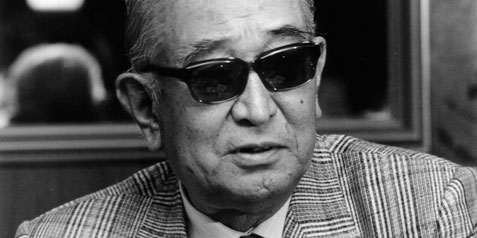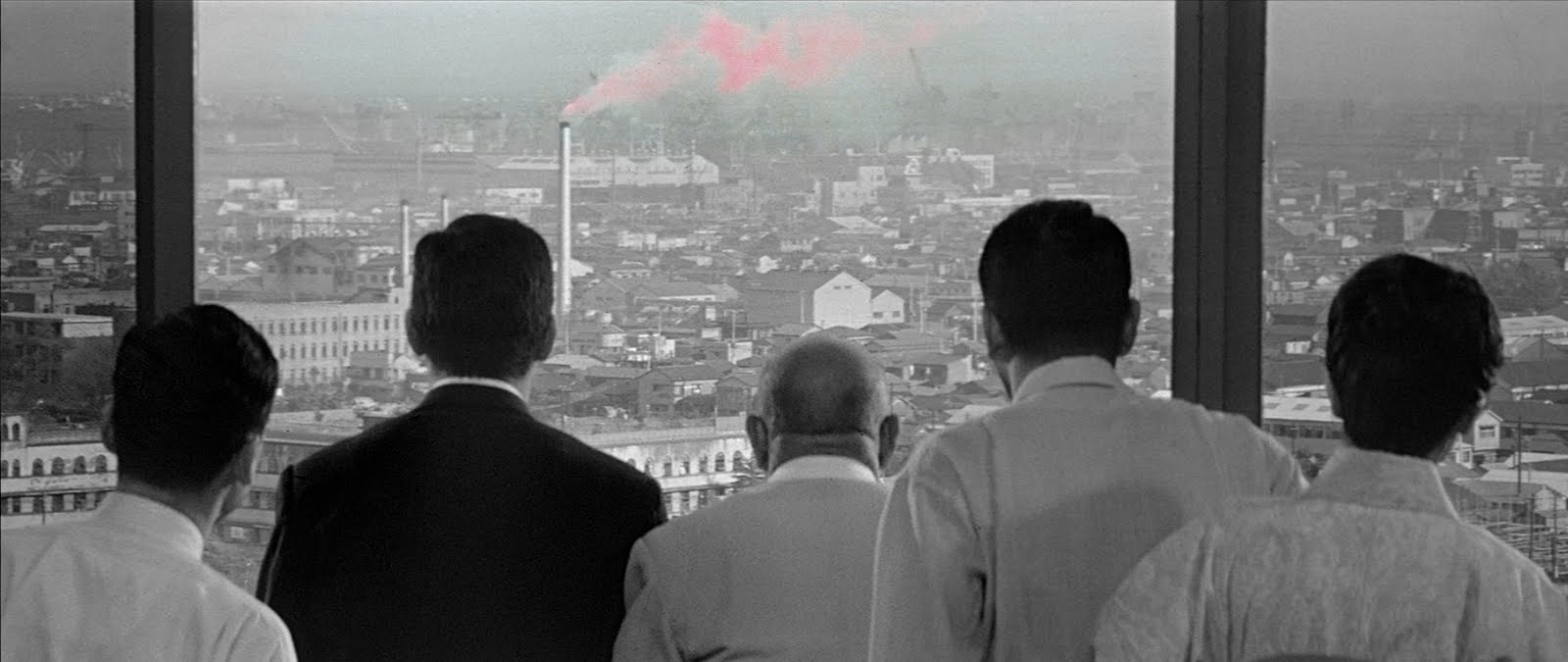
THE A.K. 100
~ john cribbs ~
March 23rd marked the 100th anniversary of Akira Kurosawa's birth, and it was great seeing all the recognitions and retrospectives held in his honor. His films were shown in various theaters and in bulk on TCM, Criterion released a massive commemorative dvd set (you jerks, I already own 90% of them!) and his life and work were reevaluated in numerous tributes over the last month. No filmmaker is more deserving of such posthumous praise than the great Japanese master, something I was reassured of after going back and watching most of his movies over the last few weeks (including The Quiet Duel, the only one I had never seen before* - I was surprised to find it wasn't a jidaigeki about a sword duel that's, uh, really quiet.)
Beyond his obvious influence on international cinema and irrefutable importance to the history of the Japanese film industry, the pure power and sophistication of his work - made up of, I've determined, no less than a dozen flat-out masterpieces - simply cannot be overstated. The films are ripe with incredible moments, moments that can be found even in the handful of his films that don't work overall (Scandal, The Idiot, Dersu Uzala.) It was just such a moment from his 1963 masterpiece High and Low, where the definitive moment of the film is signified by the sight of pink smoke rising into the black & white sky, that gave this website its name. There are literally thousands of such timeless, memorable moments from the 30 films of Kurosawa's 57 year career... but here are a mere 100, one for each year of the centennial.
* Of course I'm exempting Those Who Make Tomorrow, his 1946 film (never released in America) that not even Donald Ritchie has seen.

100 GREAT MOMENTS
FROM THE FILMS OF AKIRA KUROSAWA
An abandoned sandal sits in the rain, is chewed up by a dog and finally floats down the river in a beautiful demonstration of the transition of time. Sugata Sanshiro (1943)
Jujitsu purists ambush judo sensei Yano by the river - all of them end up in the drink. Sugata Sanshiro (1943)
A bright lotus blossom in the icy mud pond. Sugata Sanshiro (1943)
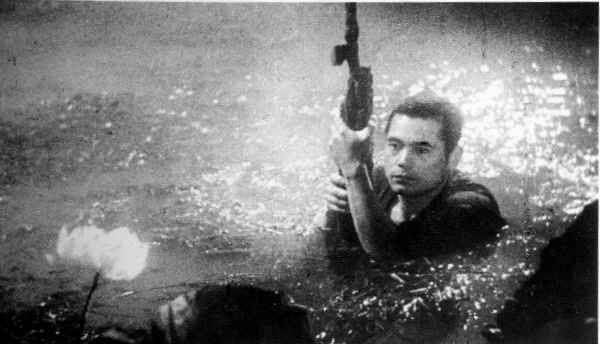
Bowing to opponent Hansuke Murai (Takashi Shimura), Sugata (Susumu Fujita) rips the left knee of his pants. Murai grins. Sugata Sanshiro (1943)
The final duel among the windswept reeds beneath the storming clouds, and the loser whose corpse slides slowly down the hill. Sugata Sanshiro (1943)
One of the factory girls leaves the dormitory, gazes up at the moon, hears a distant train whistle and begins to weep uncontrollably. The Most Beautiful (1944)
Two girls are coming back from relaxing on the factory roof through the dormitory window; one of them realizes the other one isn't behind her, returns to the window, and is shocked to see her friend has fallen to the ground. The injured girl looks up at her friend's horrified face. The Most Beautiful (1944)
A stoic barrier commander (Susumu Fujita) grins knowingly as a chief retainer, disguised as a monk to protect his lord's identity, ad libs his order's religious subscription from a blank scroll. The Men Who Tread on the Tiger's Tail (1945)
The chief retainer is forced to beat his own master to convince the barrier guards that the lord's porter disguise is genuine. The Men Who Tread on the Tiger's Tail (1945)
The would-be assassin is so taken aback by a dreaming Sugata smiling in his sleep that he decides not to kill him. Sanshiro Sugata Part II (1945)
Yukie (Setsuko Hara) looks over the devastated remains of the rice crop she has toiled in, trampled by neighbors angry over the politics of her murdered husband, and immediately begins working again. No Regrets for Our Youth (1946)
A post-war couple, unable to obtain tickets to a concert because of black market scalpers, sit together in the ruins of an abandoned bandshell and pretend to hear Schubert's Unfinished Symphony. One Wonderful Sunday (1947)
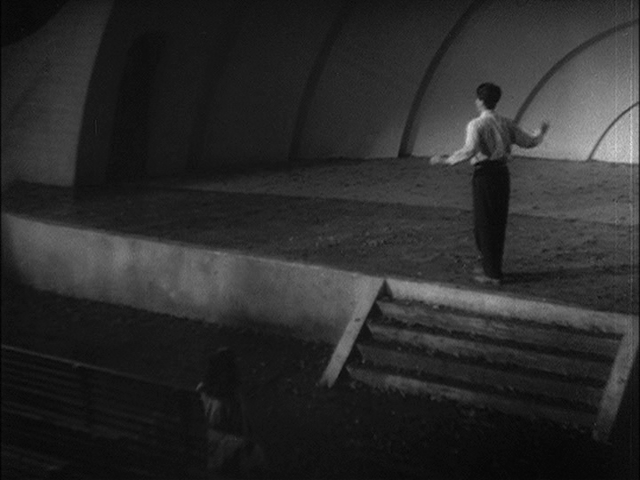
Matsunaga (Toshiro Mifune) finds a coffin washed up on the beach, breaks it open with an axe, discovers a sick and insane version of himself inside and is chased down the shoreline by his maniacal doppleganger. Best nightmare scene ever filmed? Drunken Angel (1948)
A white carnation floating on the surface of the slum's polluted sump, shed by Matsunaga (Toshiro Mifune) on his way to face his doom. Drunken Angel (1948)
The unsanitary South Pacific field hospital with its crying wounded, exhausted physicians, perpetual buzzing of a fan, and crashing drops of rain into a bed pan. The Quiet Duel (1949)
An awkward moment between father and son (Takashi Shimura and Toshiro Mifune) as they try to light each other's cigarettes turns into one of affection and understanding as they break into wide grins. The Quiet Duel (1949)
Rookie detective Murakami (Toshiro Mifune) tracks his stolen service revolver in the heat of a scarred and sizzling post-war Tokyo. Stray Dog (1949)
The showgirls come off stage and literally collapse on the floor, soaked in sweat. Stray Dog (1949)
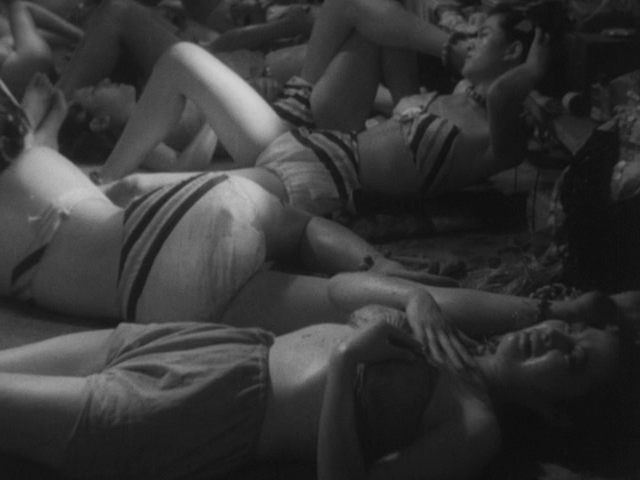
The grieving husband of a murdered woman tears the tomatoes out of the garden behind their house - "What's the point?!" - and Murakami gazes dejectedly at the smashed produce. Stray Dog (1949)
Murakami watches as the killer's girlfriend twirls around madly wearing the dress that a series of murders and robberies have bought until her mother tears it off in shame. Stray Dog (1949)
A pair of legs belonging to the hunted killer with the stolen gun stop descending the stairs as Detective Sato (Takashi Shimura) calls to check in with the station, and slowly retreat back up. Stray Dog (1949)
Hiruta (Takashi Simura), corrupted by the heads of a gossip rag, breaks down in front of his terminally ill daughter. Scandal (1950)
"Look, it's a miracle! Stars have fallen into that filthy pond." Hiruta and Aoye (Toshiro Mifune) drunk on Christmas night. Scandal (1950)
Sunlight through the leaves of overhead trees in a tantilizingly subjective tracking shot that brings us into the first of several versions of the same story. Rashomon (1950)
The wind that lifts the veil of the passing Masako (Machiko Kyo), prompting the bandit Tajomaru (Toshiro Mifune) to attack the couple on the forest road. Rashomon (1950)
Tajomaru's face as the samurai's wife emasculates him in the woodcutter's version of the story. Rashomon (1950)
The amazingly clumsy choreography of the "real" fight between the bandit and the samurai. Rashomon (1950)
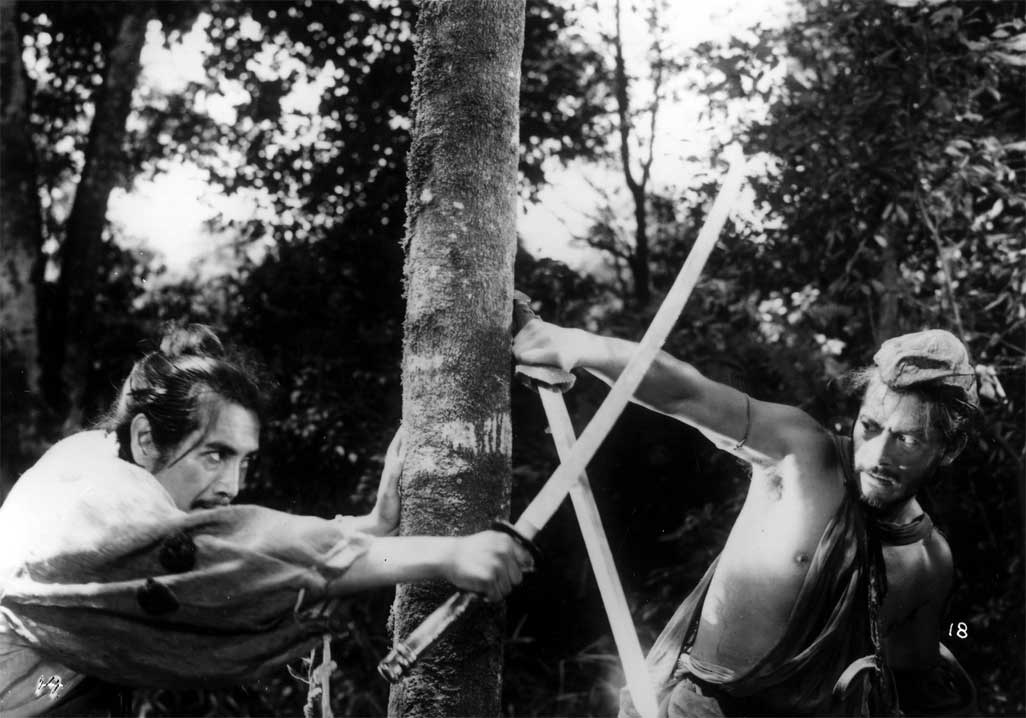
The face of Kayama (Minoru Chiaki), stupid with pride and numb with shock, as he watches the money burn in the fire. The Idiot (1951)
Kanji Watanabe (Takashi Shimura), stunned by his doctor's prognosis of terminal stomach cancer, walks onto the Tokyo streets oblivious of the sights and sounds around him until he is almost run over by a car. Ikiru (1952)
The flashback to the funeral of Watanabe's wife: the hearse pulling away and his son yelling "Mother is leaving us behind!" Ikiru (1952)
Watanabe's childlike wonder as he watches the peep show. Ikiru (1952)
The young woman Toyo explains to Watanabe how good her job at the toy factory makes her feel: "As if all the children of Japan were my friends!" Ikiru (1952)
The final image of Watanabe, alone on a swing at night with gentle snow falling, singing about life. Ikiru (1952)
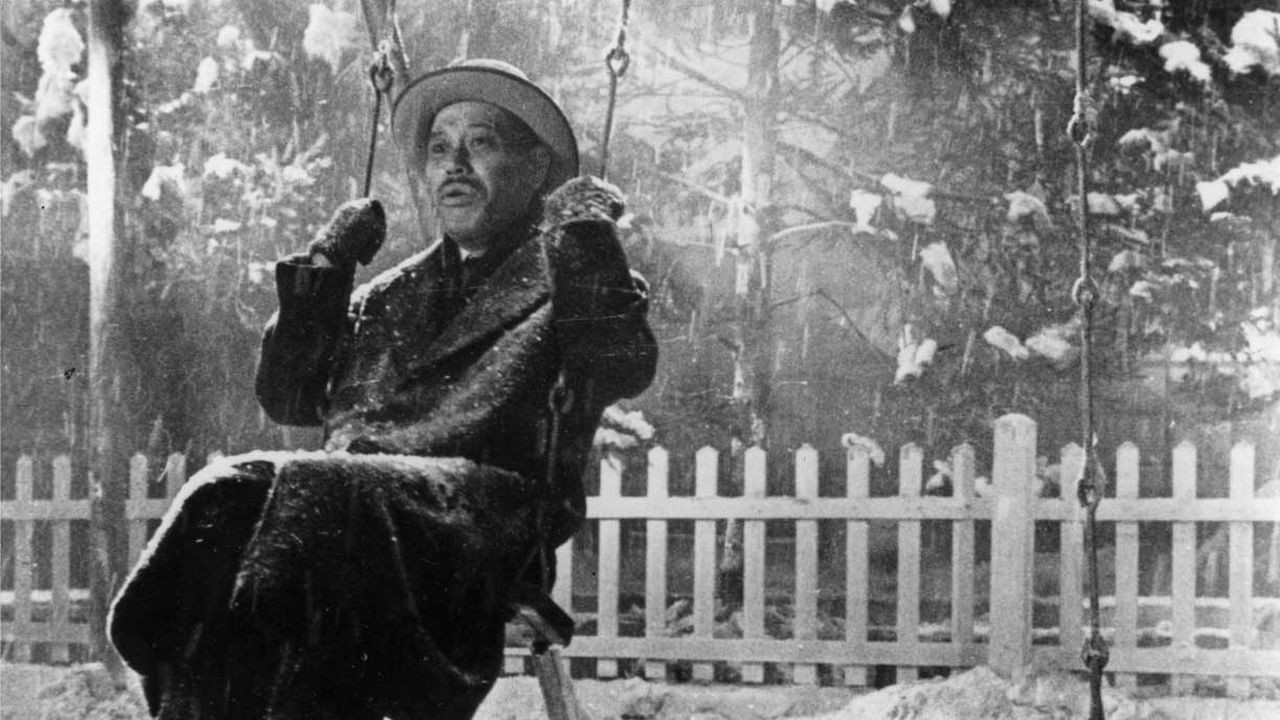
Kanbê Shimada (Takashi Shimura) instructs the young Katsushiro to ambush the prospective warriors with a stick as they enter the hut. Katayama doesn't even walk through the door - "Surely you jest!" Seven Samurai (1954)
...whereas drunk and muttering Kikuchiyo (Toshiro Mifune) gets laid out. Seven Samurai (1954)
Kikuchiyo rides an old nag behind a farmhouse...the nag reappears alone, followed by a limping samurai. Seven Samurai (1954)
Master swordsman Kyuzo sits by a tree looking idly at wildflowers while he waits for the bandits he's about to ambush and kill. Seven Samurai (1954)
The eerie old lady with the scythe moves in to avenge her son... Seven Samurai (1954)
Heihachi's funeral - Kikuchiyo raises the banner. Seven Samurai (1954)
Mifune's finest freakout: Kikuchiyo in the water, the mill ablaze behind him, clutching the farmer's infant son: "This is me! I was this baby!" Seven Samurai (1954)
Shimada raises the bow and arrow in the rain. Seven Samurai (1954)
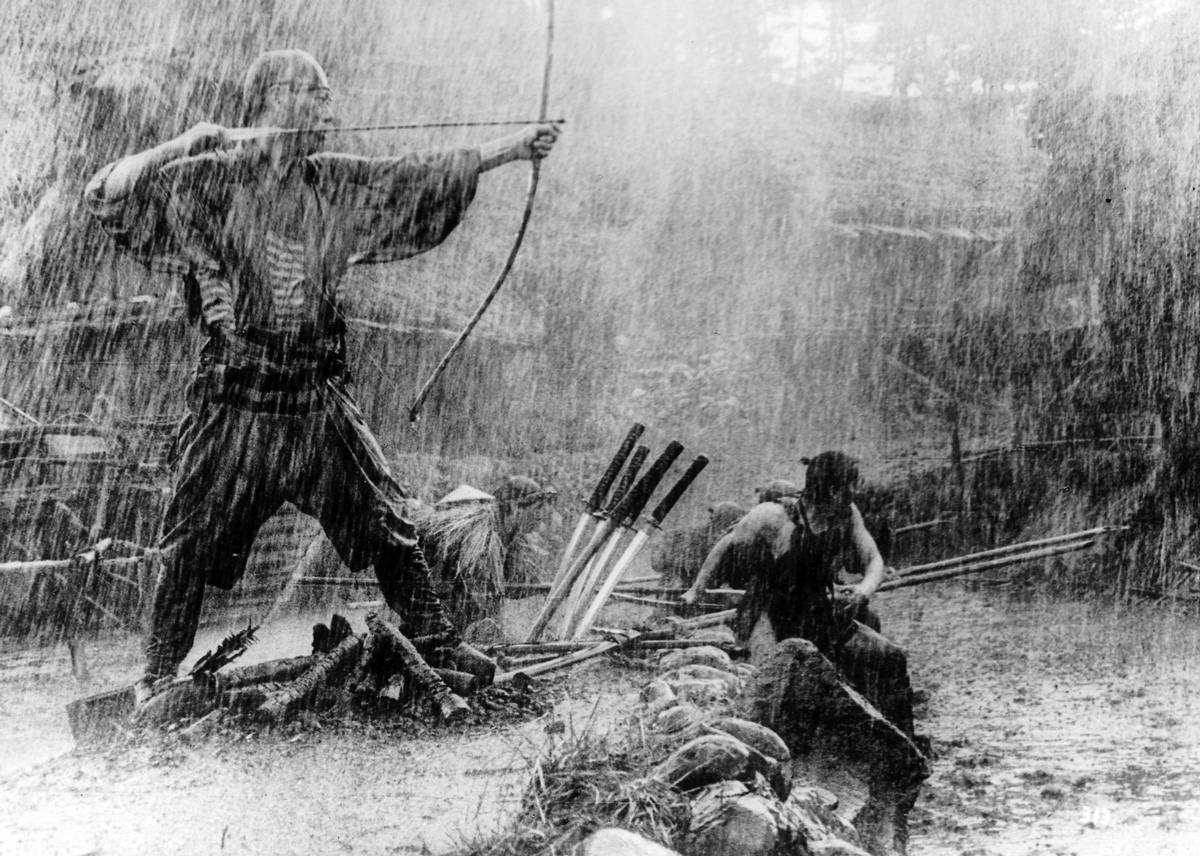
Kikuchiyo prepares for the final battle - "I can't kill a lot with one sword!" Seven Samurai (1954)
The remaining samurai run to the sound of approaching hooves, but the horses are riderless. The battle is over - there's no one left to kill. Seven Samurai (1954)
Despite their fierce legal wranglings, Nakajima (Toshiro Mifune) buys lemonade at the court for everybody...even dickish son Jiro (Minoru Chiaki). I Live in Fear (1955)
"What happened to the Earth? Are there still many people left there?" The heartbreaking end of I Live in Fear (1955)
The trees move in on Spider Web Castle. Throne of Blood (1957)
The arrow-ridden body of Washizu Taketoki (Toshiro Mifune) pitches forward into the fog and vanishes. Best movie death ever? Throne of Blood (1957)
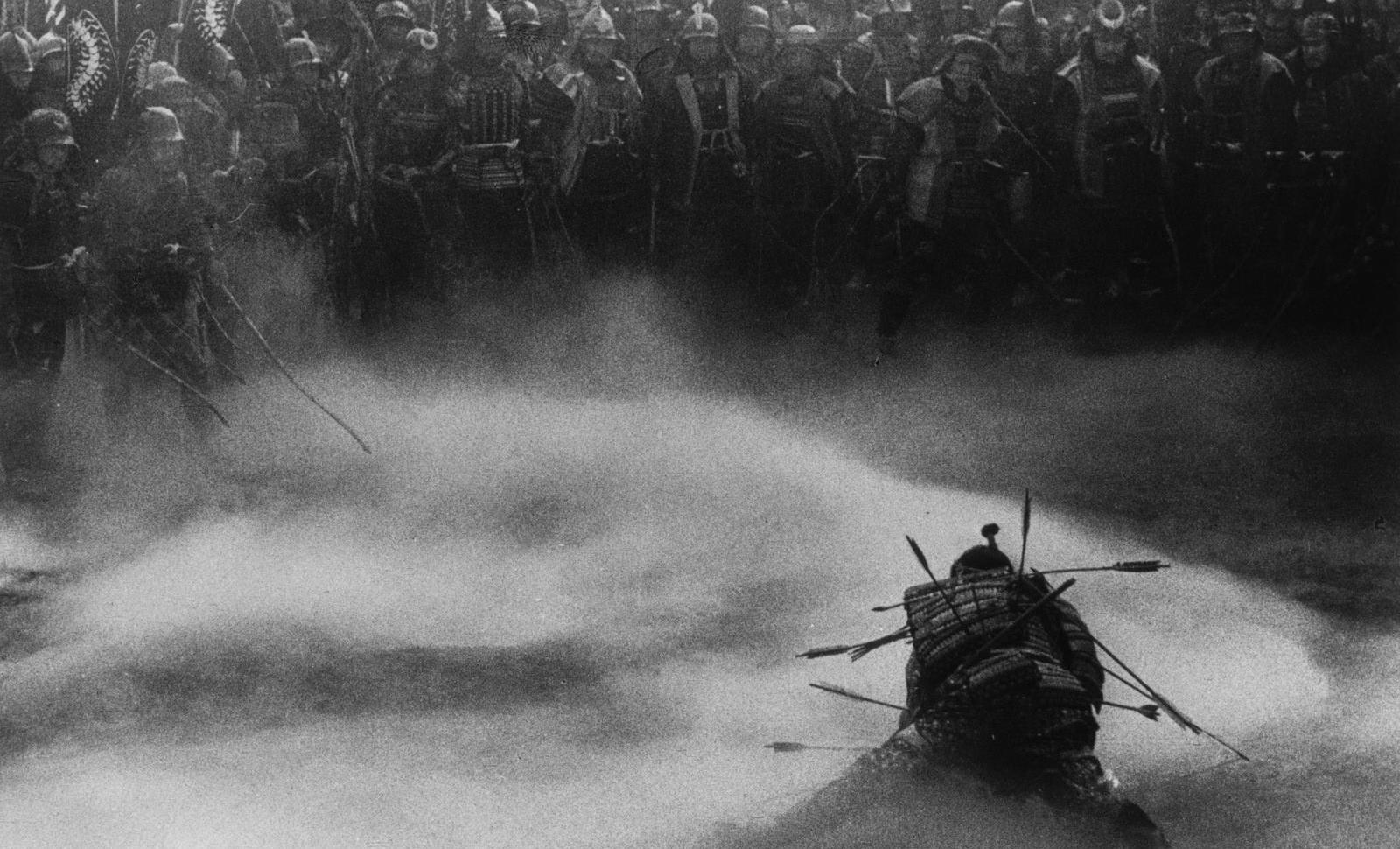
"That idiot...just as the fun was beginning." The last line of The Lower Depths (1957)
Attempting to escape under the cover of heavy fog, Tahei (Minoru Chiaki) walks right into the heavily-guarded check station he was trying to avoid. The Hidden Fortress (1958)
The two bickering peasants trying to make it uphill: Tahei kicking stones back under Matakishi's feet while Matakishi grabs Tahei's legs. The Hidden Fortress (1958)
The fugitive princess weeps for the double who was beheaded in her place. The Hidden Fortress (1958)
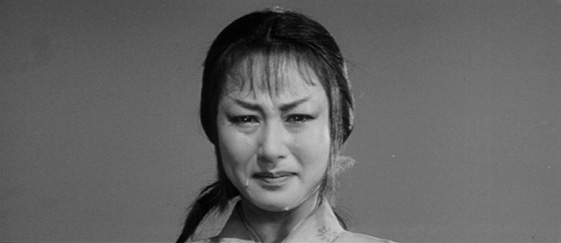
Believing the disguised princess to be a deaf-mute, the two peasants plot to steal the gold right in front of her. The Hidden Fortress (1958)
General Rokurota Makabe (Toshiro Mifune) brilliantly uses a single bar of gold to get them through the barricade. The Hidden Fortress (1958)
General Makabe runs down two guards on horseback and ends up in a spectacular lance fight against former friend-turned-enemy Tadokoro (Susumu Fijita). The Hidden Fortress (1958)
The tensest wedding ever, ending with the baited cake wheeled out before the shocked executives. "This is just a prelude!" The Bad Sleep Well (1960)
The company man gets out of police interrogation only to be issued a fresh warrant, and an ominous order from the top brass that makes him instantly jump in front of a truck. The Bad Sleep Well (1960)
Nishi (Toshiro Mifune) takes the assistant he stopped from committing suicide to his own funeral. The Bad Sleep Well (1960)
The soulless corporate head is playful and kind cooking barbeque with his family. The Bad Sleep Well (1960)
A flashlight illluminates and obscures the three men in the seventh floor office of the ministry building. The Bad Sleep Well (1960)
The helpless scream of the last survivor of the conspiracy against the company is drowned out by the wail of a train as it passes the demolished shell of Nishi's car. The Bad Sleep Well (1960)
Sanjuro (Toshiro Mifune) enters the corrupt town and passes a content-looking dog... with a human hand in its mouth. Yojimbo (1961)
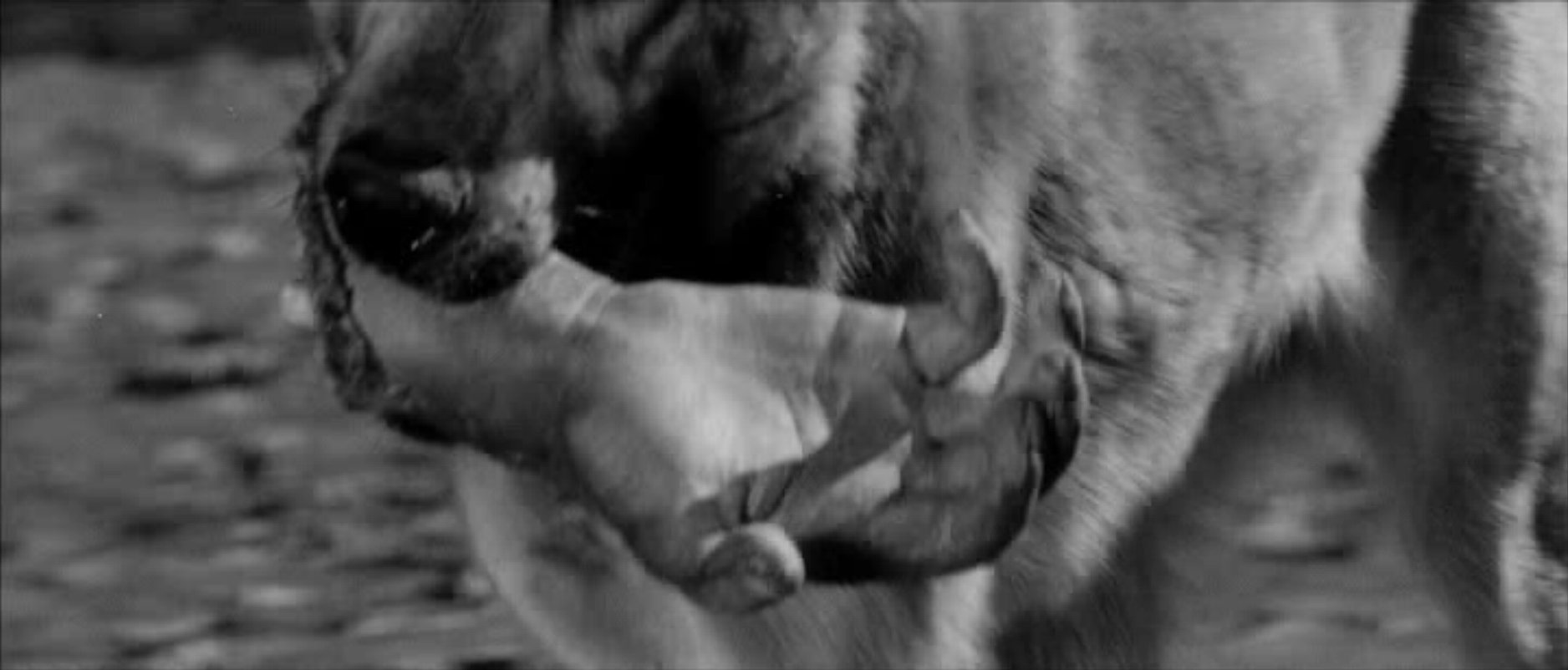
The mallet-brandishing giant. Yojimbo (1961)
The kidnapped son runs back to his mother, and she slaps him. "Coward - why didn't you bite your tongue off and die??" Yojimbo (1961)
Sanjuro sends the gangster's emissary to report that the six men guarding his concubine have been killed. Then he goes and kills the six men. Yojimbo (1961)
The cooper laments: "When a fight gets too big, they don't bother with coffins!" Yojimbo (1961)
Masaru Sato's jovial theme for the gangster's geisha plays as they scatter from the burning house. Yojimbo (1961)
"Pull back...besides, it would take a long time to kill him." Tatsuya Nakadai as Muroto in Sanjuro (1962)
The chamberlain's wife and daughter, unused to the pleasant aroma of hay in a barn, take a moment to lie down in it. Sanjuro (1962)
The chamberlain's wife tells Sanjuro: "Killing people is a bad habit...Good swords are kept in their sheaths." Sanjuro (1962)
Sanjuro's bored, weary expression at the young samurai scurrying around anxiously. Sanjuro (1962)
The captured guard comes out of the closet to offer his opinion to the bickering samurai, then immediately gets back in the closet. Sanjuro (1962)
Sanjuro takes out 30 men like he's slicing through butter. Sanjuro (1962)
Sanjuro tricks the bad guys into cutting carmeillas from nearby trees and sending them down the stream - the signal for the waiting samurai to attack. Sanjuro (1962)
After staring each other down intensely, Sanjuro defeats Muroto in one mighty stroke that sets off a geiser of blood from the swordsman's chest. Afterwards, the victor mourns his enemy. Sanjuro (1962)
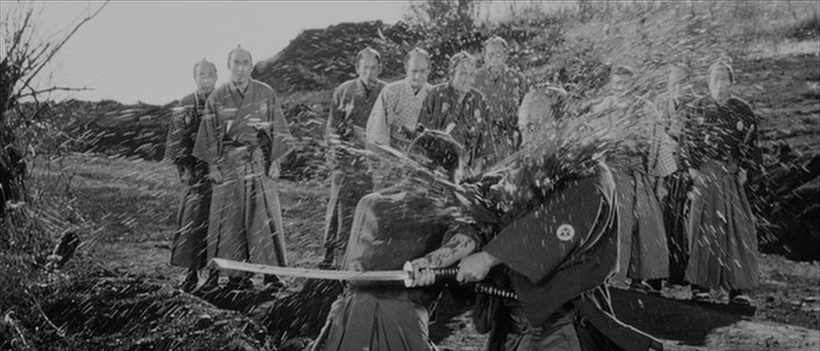
Gondo (Toshiro Mifune) gets out his old apprentice's kit to help rig the suitcase with the ransom money. High and Low (1963)
Mifune's freak-out just before tossing the bag full of money out the train window. "This is my life!" High and Low (1963)
The pink smoke. High and Low (1963)
Tailing police officers watch as the kidnapper approaches his victim and secretly gloats by requesting a light for his cigarette, causing the cops to secretly gloat over his imminent arrest. Then they have to move their car. High and Low (1963)
The condemned man's final scream. High and Low (1963)
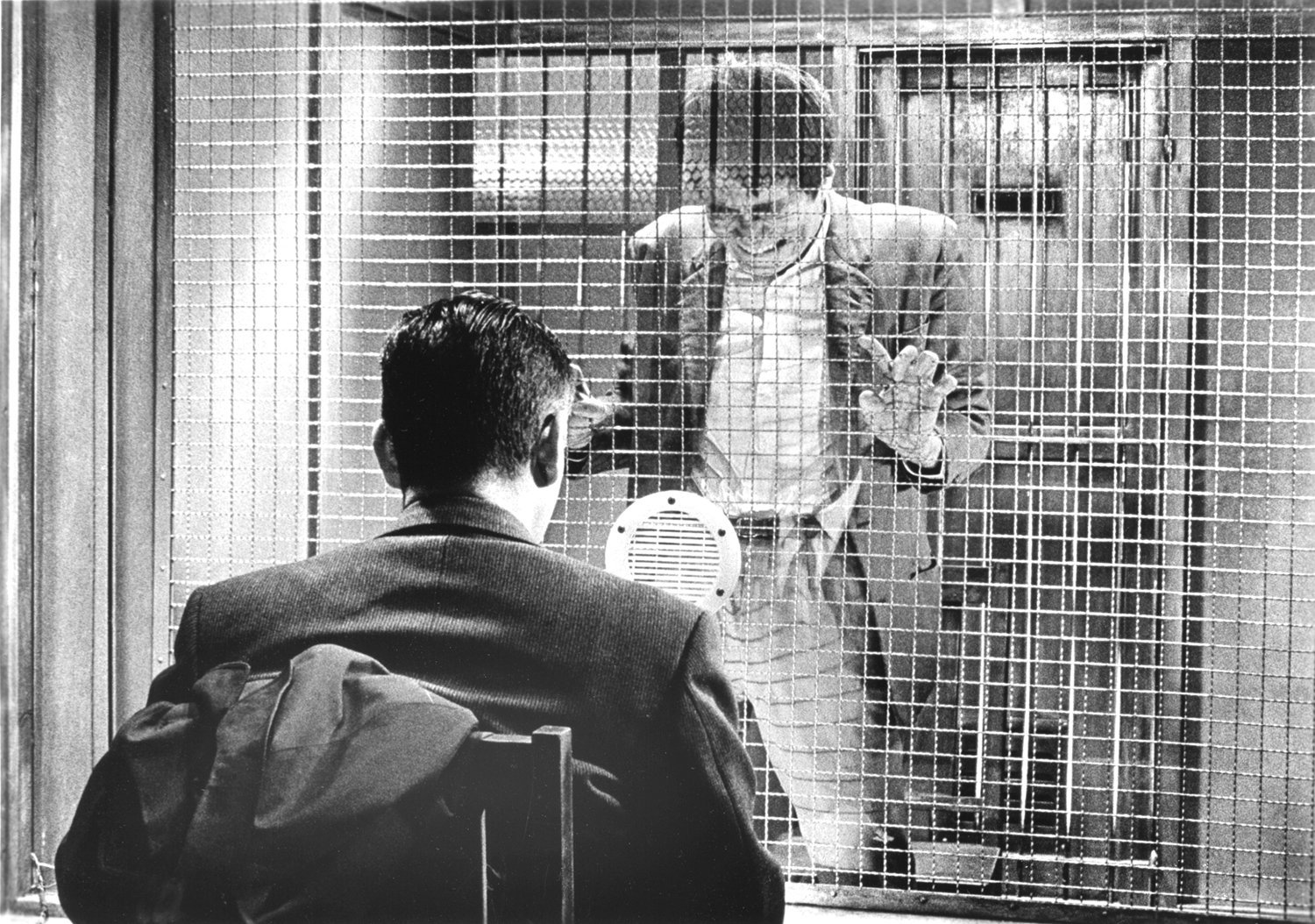
In flashback, the dying man remembers his mysterious wife and the sound of the windchime that announces her presence. Red Beard (1965)
"A bad doctor can kill you...I won't kill you, but I may break some of your arms and legs." Dr. Niide (Toshiro Mifune) uses his anatomical knowledge to beat the tar out of a gang of yakuza thugs in Kurosawa's best-looking fight scene ever. Then he heals them! Red Beard (1965)

The little boy Chobo finds Otoyo among the drying sheets and offers her lollipops: "Take them - I had a hard time stealing them." Red Beard (1965)
The devastating death of the family who drink poison together. "Since we've been married I've never seen him sleep so peacefully..." Red Beard (1965)
The nurses calling Chobo's name into the well to bring him back from the dead. Red Beard (1965)
The young doctor decides to stay at the clinic, prompting Niide to tug on his red beard. Then Mifune walks out of a Kurosawa picture for the last time. Red Beard (1965)
The son lays in the shell of a wrecked car listening to his father describe the house they'll have someday and visualizing it in detail. Dodes'ka-en (1970)
The tinker (Atsushi Watanabe) provides an old man the "poison" to kill himself with, then points out how his suicide will mean the death of all the memories of his departed family members. The old man quickly changes his mind and demands the "antidote," which the tinker takes his time searching for. Dodes'ka-den (1970)
The captain and Dersu race against the setting sun and harsh winds to cut tall grass and make a shelter against the brutal weather of the Russian tundra. Dersu Uzala (1975)
A condemned thief (Tatsuya Nakadai), secretly imitating an assassinated emperor, charms the dead man's grandson. Kagemusha (1980)
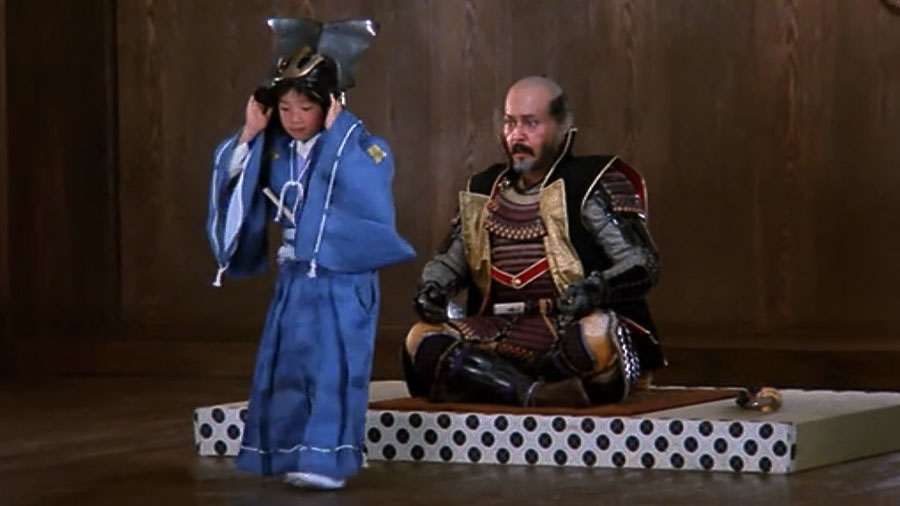
Under suspicion by the dead emperor's mistresses, the doppleganger blurts out that he's not the real emperor. A tense moment... then everybody laughs. Kagemusha (1980)
Unfooled by the deception, the emperor's horse throws the double off his back, exposing his secret to everyone in the fortress. Kagemusha (1980)
The lord's concubines fall on each other's knives as the castle is invaded. Ran (1985)
Seven minutes of silence as arrows fly, bodies fall, and the lord's castle burns ends with a gunshot. Ran (1985)
Lady Kaede (Mieko Harada) seduces her husband's murderer by pulling a knife on him and demanding he have his wife beheaded. Sexiest scene ever? Ran (1985)
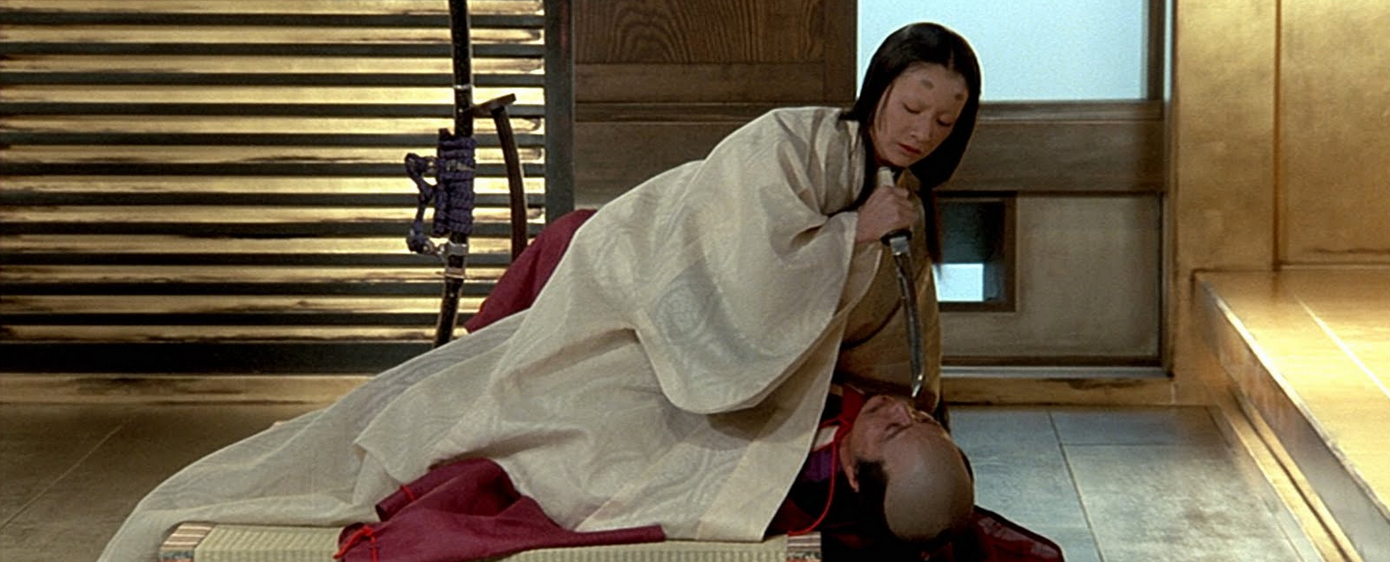
Young "I" disobeys his mother and spies on the wedding procession of the forest foxes... and they see him. Dreams (1990)
The ghosts of the young man's fellow soldiers emerge marching in formation from the train tunnel. Dreams (1990)

The gnarled remnants of a jungle gym outside a Nagasaki school. Rhapsody in August (1991)
A line of ants move up and down a rose as Nagasaki survivors chant Buddist sutras. Rhapsody in August (1991)
An elderly couple in their postwar shack as the seasons change around them - devoted love depicted in a way Kurosawa never had before. Madadayo (1993)
The teacher's final dream, and Kurosawa's. Madadayo (1993)
~ MARCH 23, 2010 ~
